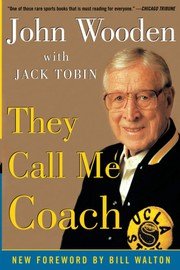“They Call Me Coach” is a memoir written by John Wooden, one of the most successful and respected coaches in the history of college basketball. Wooden’s book offers a unique and intimate look at his life, his career, and the principles and values that guided him both on and off the court.
Wooden was born in 1910 in Indiana and grew up in a small farming community. From a young age, he was passionate about basketball and played on his high school team, leading them to the state championship. He went on to play college basketball at Purdue University, where he was a standout player and earned All-American honors. After college, Wooden began his coaching career at South Bend Central High School, where he led his team to the state championship in his first year.
In 1948, Wooden became the head coach at Indiana State Teachers College (now known as Indiana State University). He quickly turned the program around and led his team to the NAIB (National Association of Intercollegiate Basketball) national championship in 1950. In 1948, he was also named Indiana “Coach of the Year”.
In 1949, Wooden became the head coach at UCLA, where he would spend the next 27 years of his career. Under his leadership, the UCLA Bruins became one of the most dominant teams in college basketball history. Wooden’s teams won an astounding 10 national championships, including seven in a row from 1967 to 1973. He was also named National Coach of the Year a record seven times.
But Wooden’s success on the court is only part of the story. In “They Call Me Coach,” Wooden reflects on the lessons he learned from his own coaches and mentors, as well as the values and principles that he tried to instill in his players. Wooden was known for his “Pyramid of Success,” a set of principles that he believed were essential for achieving success in any pursuit. These principles included things like industriousness, loyalty, and self-control, as well as the importance of teamwork and communication.
One of the most interesting aspects of “They Call Me Coach” is the way Wooden writes about his players and their relationships with him. He was known for his ability to connect with and motivate his players, and his book is filled with stories about the players he worked with and the impact he had on their lives. Wooden believed that his role as a coach went beyond just teaching basketball skills; he saw himself as a mentor and role model, and he worked tirelessly to help his players develop both on and off the court.
Overall, “They Call Me Coach” is a fascinating and inspiring read for anyone interested in basketball, coaching, or personal development. Wooden’s career and accomplishments speak for themselves, but it’s his insights and wisdom that really make this book stand out. Whether you’re a coach looking for guidance or just someone looking for a little inspiration, “They Call Me Coach” is definitely worth checking out.
3 takeaways
- The importance of having a set of guiding principles: In “They Call Me Coach,” John Wooden emphasizes the importance of having a set of principles to live by and use as a guide in all areas of life. For Wooden, these principles were outlined in his “Pyramid of Success,” which included things like industriousness, loyalty, and self-control. By following these principles, Wooden was able to achieve both personal and professional success.
- The value of hard work and perseverance: Throughout his book, Wooden stresses the importance of hard work and perseverance in achieving success. He believed that these traits were essential for any individual or team looking to achieve their goals. Wooden also emphasized the importance of continuously striving to improve and learning from setbacks and failures.
- The role of a coach goes beyond just teaching sports skills: While Wooden was known for his success on the basketball court, he saw his role as a coach as extending far beyond just teaching basketball skills. He believed that his role was to be a mentor and role model for his players, and he worked to help them develop both on and off the court. Wooden’s emphasis on building strong relationships with his players and helping them grow as individuals is an important lesson for any coach or leader.




